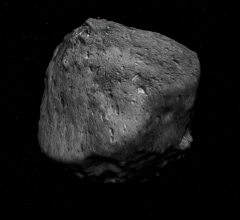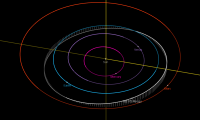Difference between revisions of "162173 Ryugu"
(Ryugu.) |
(Added compatibility.) |
||
| (15 intermediate revisions by the same user not shown) | |||
| Line 1: | Line 1: | ||
| − | {{Addon | + | {{Addon |
|1=[https://www.orbiter-forum.com/threads/delta-v-novel.41431/#post-613690 Ryugu-00.zip] | |1=[https://www.orbiter-forum.com/threads/delta-v-novel.41431/#post-613690 Ryugu-00.zip] | ||
| − | |2=francisdrake | + | |2=[[List of add-ons by francisdrake|francisdrake]] |
|3=00 | |3=00 | ||
| − | |4= | + | |4=all versions |
}} | }} | ||
| Line 31: | Line 31: | ||
|width="30%"|Inclination (i)||align="right" width="30%"|0.102690286265441 radian<br>(5.88372°) | |width="30%"|Inclination (i)||align="right" width="30%"|0.102690286265441 radian<br>(5.88372°) | ||
|- | |- | ||
| − | |width="30%"|Longitude of the ascending node (LAN, ☊)||align="right" width="30%"| | + | |width="30%"|Longitude of the ascending node (LAN, ☊)||align="right" width="30%"|0 radian<br>0° |
| − | |||
| − | |||
| − | |||
| − | |||
|- | |- | ||
!bgcolor="lightsteelblue" colspan="2"|Rotational Elements | !bgcolor="lightsteelblue" colspan="2"|Rotational Elements | ||
|- | |- | ||
| − | |width="30%"|Sidereal Rotation Period||align="right" width="50%"| | + | |width="30%"|Sidereal Rotation Period||align="right" width="50%"|87133.4717273712 seconds<br>(1.00848925610383 days) |
|- | |- | ||
|width="30%"|Sidereal Rotation Offset||align="right" width="50%"|0 | |width="30%"|Sidereal Rotation Offset||align="right" width="50%"|0 | ||
|- | |- | ||
| − | |width="30%"| | + | !bgcolor="lightsteelblue" colspan="2"|Selected physical parameters |
| + | |- | ||
| + | |width="30%"|Mean radius||align="right" width="30%"| 450 m | ||
|- | |- | ||
| − | + | |width="30%"|Mass||align="right" width="30%"|7.24641539269111×10<su>10</sup> kg | |
|- | |- | ||
| − | |width="30%"| | + | |width="30%"|Equatorial gravity||align="right" width="30%"| 0.0032 m/s<sup>-10</sup> |
|- | |- | ||
| − | |width="30%"| | + | |width="30%"|Orbital speed at surface||align="right" width="30%"|0.1034 m/s |
|- | |- | ||
| − | |width="30%"| | + | |width="30%"|Escape velocity||align="right" width="30%"| 0.000147 m/s |
|- | |- | ||
| − | |width="30%"| | + | |width="30%"|Gravity at surface||align="right" width="30%"|Ryugu 1%<br>Sun 99% |
|- | |- | ||
| − | |width="30%"| | + | |width="30%"|Note||align="right" width="30%"|*Elements given are from Ryugu.cfg file. |
| + | |} | ||
| + | |||
| + | '''162173 Ryugu''' or in [[Orbiter]] simply '''Ryugu''' is near-Earth object of the Appolo group of small bodies, discovered by Lincoln Near-Earth Asteroid Research astronomers on 10 May 1999. | ||
| + | |||
| + | Ryugu is an add-on by francisdrake released in 2023 on the forum, and is compatible with Orbiter 2016. In Orbiter, Ryugu orbits the [[Sun]] with a semi-major axis of 1.19 AU, inclination of 0.1027 radians, and eccentricity of 0.19. Its gravity is very weak, even at the surface, in OrbitMFD, Ryugu's gravity is 1% and the Sun's gravity is 99%. A person could literally jump at greater than escape speed. Rotation is just over a day. | ||
| + | |||
| + | The landing surface (hard radius) is mostly below the visual surface, so most of the time landing on the hard surface will be below the visual. Landing inside will be sort of like being inside a cave looking at the backside of the skin of the body. If you're on the daylight side, you can see the sun kind of like looking at the sun through a thin cloud deck. | ||
| + | |||
| + | The landing light on the [[Delta-glider]] works on the visual surface of Ryugu, but not inside. | ||
| + | |||
| + | ==Add-ons== | ||
| + | {| class="wikitable" style="text-align: center" | ||
| + | |colspan="8"|<center>'''Orbiter versions and add-ons which include 162173 Ryugu'''</center> | ||
|- | |- | ||
| − | + | !Add-on!!Source!!Version!!Author!!Type!!Release Date!!Compatibility!!Wiki article | |
|- | |- | ||
| − | | | + | |[https://www.orbiter-forum.com/threads/delta-v-novel.41431/#post-613690 Delta-V Novel]||O-F Resources||||francisdrake||Scenery||23 November 2023||all versions|| |
|} | |} | ||
| + | |||
| + | ==In popular culture== | ||
| + | Ryugu is the setting of the novel ''Delta-T'' by [[w:Daniel Suarez|Daniel Suarez]] depicting miners who explore this body. | ||
| Line 67: | Line 81: | ||
Ryugu orbit.png|<center>Orbits of the inner planets showing the orbit of Ryugu in white. From Wikimedia commons.</center> | Ryugu orbit.png|<center>Orbits of the inner planets showing the orbit of Ryugu in white. From Wikimedia commons.</center> | ||
</gallery> | </gallery> | ||
| + | |||
| + | {{SolarSystem}} | ||
| + | |||
| + | [[Category:Articles|Ryugu]] | ||
| + | [[Category:Celestial bodies|Ryugu]] | ||
| + | [[Category:Solar System|Ryugu]] | ||
| + | [[Category:Near-Earth objects|Ryugu]] | ||
| + | [[Category:Celestial body add-ons|Ryugu]] | ||
Latest revision as of 03:21, 19 January 2025
|
Project home: Ryugu-00.zip |
162173 Ryugu or in Orbiter simply Ryugu is near-Earth object of the Appolo group of small bodies, discovered by Lincoln Near-Earth Asteroid Research astronomers on 10 May 1999.
Ryugu is an add-on by francisdrake released in 2023 on the forum, and is compatible with Orbiter 2016. In Orbiter, Ryugu orbits the Sun with a semi-major axis of 1.19 AU, inclination of 0.1027 radians, and eccentricity of 0.19. Its gravity is very weak, even at the surface, in OrbitMFD, Ryugu's gravity is 1% and the Sun's gravity is 99%. A person could literally jump at greater than escape speed. Rotation is just over a day.
The landing surface (hard radius) is mostly below the visual surface, so most of the time landing on the hard surface will be below the visual. Landing inside will be sort of like being inside a cave looking at the backside of the skin of the body. If you're on the daylight side, you can see the sun kind of like looking at the sun through a thin cloud deck.
The landing light on the Delta-glider works on the visual surface of Ryugu, but not inside.
Add-ons[edit]
| Add-on | Source | Version | Author | Type | Release Date | Compatibility | Wiki article |
|---|---|---|---|---|---|---|---|
| Delta-V Novel | O-F Resources | francisdrake | Scenery | 23 November 2023 | all versions | ||
In popular culture[edit]
Ryugu is the setting of the novel Delta-T by Daniel Suarez depicting miners who explore this body.
Gallery[edit]
| edit The Solar System | |
|---|---|
| Central star |
Sun (Sol) |
| Planets |
Mercury - Venus - Earth - Mars - Jupiter - Saturn - Uranus - Neptune |
| Natural satellites |
Moon - Phobos - Deimos - Io - Europa - Ganymede - Titan - more... |
| Add-ons |
Planets - Dwarf Planets - Small objects - Natural satellites - Alternative star systems |

